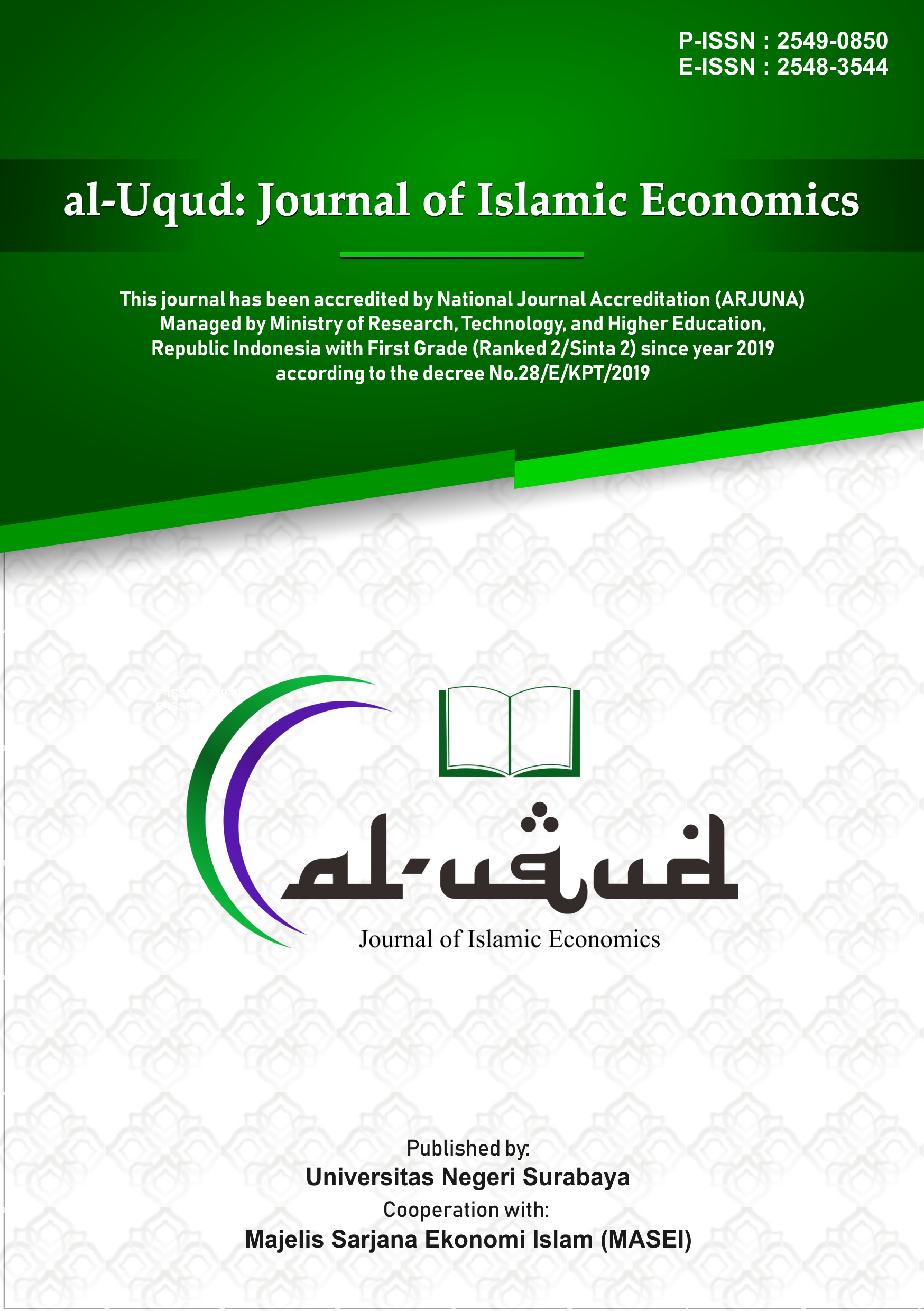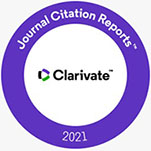Revisiting the Idealism of Syariah Audit for Islamic Financial Institutions
DOI:
https://doi.org/10.26740/al-uqud.v5n2.p184-202Keywords:
Syariah audit, Syariah governance, Islamic financial institution, AuditorAbstract
The rapid development of syariah audit goes hand in hand with demands for governance of syariah compliance that promotes accountability and transparency. From its inception, syariah audit as a concept has been interpreted and practiced from various perspectives. This research aims to conceptually revisit the ideal conception of syariah audit by looking back at its root, discussing the emergence, meaning, characteristics, and issues of syariah audit. This study demonstrates the need for more holistic development of the conceptual framework for the syariah audit. It consists of defining subject appropriately, standardising the qualification and competence requirements for syariah certified auditors, regulating who should appoint syariah auditors, identifying the scope and extent of syariah audit, establishing the regulatory body forsyariah audit, and enforcing the dedicated standards for syariah audit.
References
Ab Ghani, N. L., Ariffin, N. M., & Rahman, A. R. A. (2019). The measurement of the effective internal audit function in Islamic financial institutions. International Journal of Economics Management and Accounting, 27(1), 141165.
Abdallah, A. A. (1994). The role of Syariah supervisory board in setting accounting policies in Islamic banks. In Development of accounting system for Islamic banks: selected readings, 129-142. London: Institute of Islamic banking and insurance.
Abomouamer, F. M. (1989). An analysis of the role and function of shariah control in Islamic banks. PhD. Dissertation. The University of Wales.
Accounting and Auditing Organization for Islamic Financial Institutions. (2010). Accounting, auditing and governance standards for Islamic financial institutions.
Akhtarzaite, A. (2006). The concept of dhara`i and its role in the realization of Maqasid al-Syariah: an exploration of its application to some practical aspects of Islamic insurance. In Paper presented at the International Conference on Islamic Jurisprudence and the Challenges Of The 21st Century: Maqasid al-Syariah and its Realization in Contemporary Societies. Kuala Lumpur, Malaysia.
Al-Abji, K. A. F. (1989). Developing the responsibility of the auditor to meet the requirements of investment in Islamic banks. Islam Today (Vol. 7).
Al-Buraey, M. A. (1990). Management and administration in Islam. Dhahran: King Fahd University of Petroleum and Mineral.
Algabry, L., Alhabshi, S. M., Soualhi, Y., & Alaeddin, O. (2020). Conceptual framework of internal Shar??ah audit effectiveness factors in Islamic banks. ISRA International Journal of Islamic Finance, 12(2), 171193. Retrieved from https://doi.org/10.1108/IJIF-09-2018-0097
Ali, N. A. M., Mohamed, Z. M., Shahimi, S., & Shafii, Z. (2015). Competency of shariah auditors in Malaysia: Issues and challenges. Journal of Islamic Finance, 4(1), 22 30.
Ali, N. A. M., & Shafii, Z. (2014). Shariah audit in Islamic banks: An insight to the future shariah auditor labour market in Malaysia. Procedia - Social and Behavioral Sciences, 18(1), 120. https://doi.org/10.1016/j.sbspro.2014.06.023
Attahiru, M. S., Al-Aidaros, A.-H., & Yusof, S. md. (2016). Moderating role of hisbah institution on the relationship of religiosity and Islamic culture to Islamic work ethics in Nigeria. International Review of Management and Marketing, 6(8), 125132.
Banaga, A., Ray, G. H., & Tomkins, C. R. (1994). External audit and corporate governance in Islamic Banks: a joint practitioner-academic research study. England: Avebury.
Bank Negara Malaysia. (2010). Governance framework for islamic financial institutions.
Berghout, A. A. (2006). Maqasid al-syariah as a tool of intellectual reform and civilizational renewal. In Paper presented at the International Conference on Islamic Jurisprudence and the Challenges Of The 21st Century: Maqasid al-Syariah and its Realization in Contemporary Societies, Kuala Lumpur, Malaysia.
Bosi, M. K., & Joy, M. D. (2017). Issues and challenges of auditing in Islamic financial institutions. International Journal of Humanities and Social Science Invention, 6(2), 1520.
Briston, R., & El-Ashker, A. (1986). Religious audit: could it happen here? Accountancy, 120121.
Chapra, U. (1992). The role of worldview and strategy. In Chapra, U., Islam and the Economic Challenge (pp 1-9). Leicester, UK: The Islamic Foundation.
CPA Australia. (2006). Auditing and assurance handbook. Australia.
Dogarawa, A. B. (2013). Hisbah and the promotion of ethical business practices: A reflection for the shariah implementing states in Nigeria. International Journal of Islamic and Middle Eastern Finance and Management, 6(1), 5163. Retrieved from https://ideas.repec.org/a/eme/imefpp/v6y2013i1p51-63.html
Dusuki, A. W. (2006). The application of the doctrine of maqasid al-syariah to corporate social responsibility (CSR). In Paper presented at the International Conference on Islamic Jurisprudence and the Challenges Of The 21st Century: Maqasid al-Syariah and its Realization in Contemporary Societies, Kuala Lumpur, Malaysia.
El-Gamal, M. (2005). Islamic bank corporate governance and regulation: a call for mutualisation.
El Qorchi, M. (2005). Islamic finance gears up. Finance & Development (F&D): A Quarterly Magazine of the IMF, 42(4).
Fakhfakh, M. (2017). The harmonization of audit reports of Islamic banks: An advanced and original empirical investigation. Journal of Islamic Accounting and Business Research, 8(2), 203228.
Fink, A. (2014). Conducting research literature reviews: From the internet to paper (Fourth). Thousand Oaks, CA: SAGE Publications.
Furqani, H. (2003). Institusi Hisbah: model pengawasan pasar dalam system ekonomi Islam [The institution of Hisbah: a model of market supervisor in an Islamic economic system]. Journal of the Islamic Economic Forum for Indonesian Development, 2(1), 5680.
Gambling, T., & Karim, R. A. (1993). Business and accounting ethics in Islam. London: Marsell Publishing Ltd.
Grais, W., & Pellegrini, M. (2006). Corporate governance and Syariah compliance in institutions offering Islamic financial services. World Bank Policy Research Working Paper 4054, November 2006.
Hameed, S. (2009). Accounting and auditing for Islamic financial institutions. Kuala Lumpur, Malaysia: IIUM Press.
Haniffa, R., & Hudaib, M. (2002). A theoretical framework for the development of the islamic perspective of accounting. Accounting, Commerce and Finance: The Islamic Perspective Journal, 6((1&2)), 171.
Harahap, S. S. (2002). Auditing dalam perspektif Islam. Jakarta: Pustaka Quantum.
Hood, K. L., & Bucheery, R. A. (1999). The interaction of financial and religious (Islamic) auditors with reference to the audit expectation gap in Bahrain. Accounting, Commerce and Finance: The Islamic Perspective Journal, 3(1&2), 2558.
Ibn Ashur, M. A. (2006). Treatise on maqasid al-syariah (mohamed el-tahir el-mesawi, Trans). London: The International Institute of Islamic Thought.
Imran, M. S., Ahmad, A., & Bhuiyan, M. Z. H. (2012). Auditing in islamic perspective and auditing as practiced in some selected islamic banks operating in Bangladesh. IIUC Studies, 9, 293306. Retrieved from https://doi.org/10.3329/iiucs.v9i0.24033
International Federation of Accountants [IFAC]. (2005). Code of ethics for professional accountants.
International Federation of Accountants Education Committee (IFAC). (1998). Competence-based approaches to the professional preparation of accountants. In Discussion Paper.
Janahi, K. A. (2000). Auditing of Islamic banks a practitioners perspective. In In Asma Siddiqi (ed.) Anthology of Islamic Banking. London: Institute of Islamic Banking and Insurance.
Kahf, M. (2006). Maqasid al shariah in the prohibition of riba and their implications for modern islamic finance. In Paper presented at the IIUM International Conference on Maqasid al Shariah.
Karim, R A A. (1990). The independence of religious and external auditors: the case of Islamic banks. Accounting, Auditing and Accountability Journal, 3(3), 3444.
Karim, Rifaat Ahmed Abdel. (2001). International accounting harmonization, banking regulation, and Islamic banks. The International Journal of Accounting, 36, 169193.
Khalid, A. A. (2020). Role of audit and governance committee for internal audit effectiveness in Islamic banks. Asian Journal of Accounting Research, 5(1), 8189. Retrieved from https://doi.org/10.1108/AJAR-10-2019-0075
Khalid, A. A., Halim, H. A., & Sarea, A. M. (2019). Exploring undergraduate students awareness of internal Shar??ah auditing in Malaysia. Humanities and Social Sciences Reviews, 7(1), 461468.
Khalid, A. A., Haron, H., & Masron, T. A. (2018). Competency and effectiveness of internal Shar??ah audit in Islamic financial institutions. Journal of Islamic Accounting and Business Research, 9(2), 201221.
Khan, M. A. (1985). Auditing in Islamic framework. Hamdard Islamicus, 8(4), 6576.
Khan, M. A. (2001). Role of supreme audit institutions in shaping the Islamic economy in the 21st century. IIUM Journal of Economics and Management Sciences, 9(1), 77100.
Laldin, M. A., & Furqani, H. (2012). Maq??id al-shar??ah and the foundational requirements in developing islamic banking and finance. SRA International Journal of Islamic Finance, 4(1), 183189. https://doi.org/10.12816/0002743
Muhammad, R. (2018). Syariah governance for Islamic banking: what can be learnt from Malaysia? Conference on Islamic, Accounting, and Economics (CIMAEF) Proceeding, 1, 11123.
Najeeb, S. F., & Ibrahim, S. H. M. (2014). Professionalizing the role of Shariah auditors: How Malaysia can generate economic benefits. Pacific-Basin Finance Journal, 28(C), 91109. https://doi.org/10.1016/j.pacfin.2013.10.009
ORegan, D. (2004). Auditors dictionary: terms, concepts, processes and regulations. (USA, Ed.). John Wiley & Sons, Inc.
Othman, R., & Ameer, R. (2015). Conceptualizing the duties and roles of auditors in Islamic financial institutions: What makes them different? Humanomics, 31(2), 201213. Retrieved from https://doi.org/10.1108/H-04-2013-0027
Palmer, K. N., Ziegenfuss, D. E., & Pinsker, R. E. (2004). International knowledge, skills, and abilities of auditors/accountants: Evidence from recent competency studies. Managerial Auditing Journal, 19(7), 889896.
Pricewater House Coopers. (2011). Audit: industry insights. Retrieved November 1, 2012, from http://www.pwc.com.my
Puad, N. A. M., Shafii, Z., & Abdullah, N. I. (2019). Understanding the planning process and challenges in Shar??ah audit execution: the case of Malaysian takaful operators. Kyoto Bulletin of Islamic Area Studies, 12(2), 6985.
Rahim, A., Bakar, A. N. B., & Syafie, A. W. (2004). A preliminary study on the responsibility & independence of Syariah advisors of Islamic banks. In Paper presented at the IIUM Accounting Conference II, Kuala Lumpur, Malaysia.
Rahman, A. (1998). Issues in corporate accountability and governance: an Islamic perpesctive. AJISS, 15(1), 5569.
Rahman, N. A., Mastuki, N., Osman, M. R., & Kasim, N. (2020). Islamic legal maxim for audit in Islamic Bank. Journal of Islamic Accounting and Business Research, 11(2), 457471.
Shahzad, M. A., Saeed, S. K., & Ehsan, A. (2017). Shar?ah audit and supervision in shar?ah governance framework: Exploratory study of islamic banks in Pakistan. Business & Economic Review, IM Sciences, Peshawar, 9(1), 103118.
Simpson, A., & Willing, P. (2000). Accounting and auditing issues in Islamic banking. In In Asma Siddiqi (ed.), Anthology of Islamic Banking. London: Institute of Islamic Banking and Insurance.
Sultan, S. A. M. (2007). A mini guide to syariah audit for islamic financial institutions- A primer. Kuala Lumpur: Cert Publications.
Syafei, A. W. (2005). The responsibility and independence of syariah advisors and the syariah review process in the Indonesian Islamic banks. Unpublished thesis. International Islamic University Malaysia.
Webster, J., & Watson, R. T. (2002). Analyzing the past to prepare for the future: Writing a literature review. MIS Quarterly, 26(2), xiiixxiii. Retrieved from https://www.jstor.org/stable/4132319
Yasoa, M. R., Abdullah, W. A. W., & Endut, W. A. (2020). The role of shariah auditor in islamic banks: The effect of shariah governance framework (SGF) 2011. International Journal of Financial Research, 11(4), 443452.
Yazid, H., & Suryanto, T. (2016). An investigation of factors influencing audit quality according to islamic audit: A study for the jakarta islamic index. International Journal of Economics & Business Administration (IJEBA), 0(1), 2038.
Yussof, S. A. (2013). Prospects of a audit framework for Islamic financial institutions in Malaysia. Islam and Civilisational Renewal (ICR), 4(1), 123.
Zaid, O. A. (2000). The appointment qualifications of muslim accountants in the middle ages. Accounting Education, 9(4), 329342.
Ziauddin, A. (1991). Islamic banking at the crossroads. In In A.M. Sadeq, A.H. Permanik, N Mustapha bin Nik Hassan (eds) Development & finance in Islam: Proceedings of the International Seminar on Islamic Economics, 1987. Petaling Jaya, Malaysia: IIUM Press.
Downloads
Published
How to Cite
Issue
Section
License
Copyright (c) 2021 al-Uqud : Journal of Islamic Economics

This work is licensed under a Creative Commons Attribution 4.0 International License.
CC BY 4.0 Abstract views: 1190
,
Abstract views: 1190
, PDF Downloads: 1002
PDF Downloads: 1002








